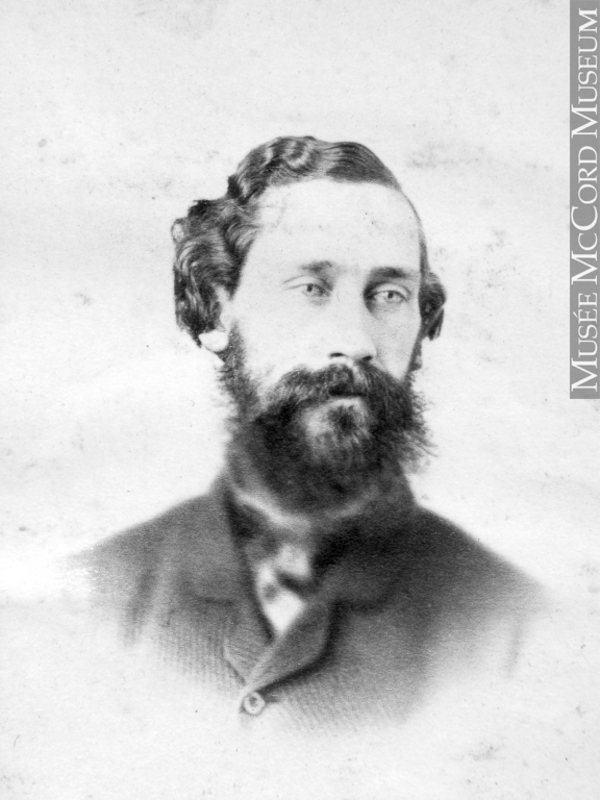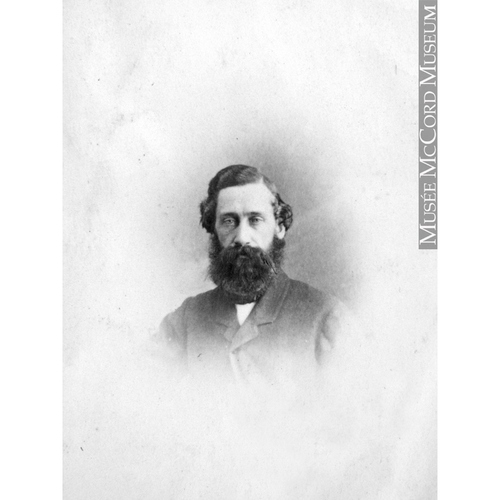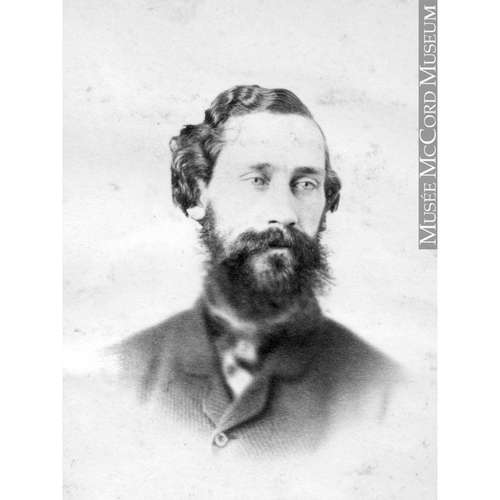
Source: Link
GOULD (Gold), JOSEPH, farmer, miller, businessman, politician, and philanthropist; b. 29 Dec. 1808 in Uxbridge Township, Upper Canada, near the present town of Uxbridge, the third of ten children of Jonathan Gold and Rachel Lee; m. 1 Jan. 1839 Mary James, and they had 11 children; d. 29 Jan. 1886 at Uxbridge.
Joseph Gould (he changed his name from Gold while he was in school) was born in the sparsely settled township of Uxbridge three years after his family arrived from Germantown, Pa. He received little education at the local school and was largely self-taught. He took up carpentry briefly before acquiring a farm with the help of a loan from a neighbour, Ezekiel James, his future father-in-law. He also bought a sawmill, and after initial difficulties it was soon operating profitably. Gould prospered as the population of the area grew over the next decades.
Always interested in the well-being of his fellow man, Gould was introduced to events in the outside world by a visit to York (Toronto) in 1830 and by the reading of William Lyon Mackenzie*’s Colonial Advocate. He became a strong supporter of Mackenzie and the Reform movement in the 1830s. In 1837, Gould, who believed in a peaceful solution to the grievances of the people, was nevertheless persuaded by approximately 50 of his neighbours to lead them to Montgomery*’s Tavern on Yonge Street, headquarters for the planned attack on Toronto. He fought in the battle near the inn and was caught while fleeing to the United States. He was sentenced to transportation to Van Diemen’s Land (Tasmania), but his sentence was reduced to nine months’ imprisonment. In October 1838 he was pardoned under the general amnesty granted by Lord Durham [Lambton*].
Once released, Gould returned to farming and business. As a farmer he built up a large holding and at one time worked between 600 and 700 acres. He also speculated in land, owned mills and commercial property in the village of Uxbridge, and ran the Whitby, Lake Scugog, Simcoe and Huron Road from 1865 to 1876, the first two years in partnership with Chester Draper. In the 1860s he supported the proposed railway from Whitby to Lake Huron and paid for a large share of the survey’s costs himself. This railway met opposition from many farmers in the county because they would have borne most of the cost without benefitting from the line. While the route was being debated, the Toronto and Nipissing Railway was built. Seeing that the Whitby and Lake Huron would fail, Gould had also promoted vigorously the Toronto and Nipissing and bought a considerable amount of stock in it as well.
Gould first held political office in 1836–37 when he served as township commissioner for Uxbridge. From 1842 to 1854 he was district councillor and, as a member of the provisional county council established in 1851, he was instrumental in the creation of Ontario County the following year. He became the first reeve of Uxbridge Township in 1853, the first warden of Ontario County in 1855, and finally reeve of the village of Uxbridge. As a Reformer, Gould campaigned three times for the seat of Ontario North in the Legislative Assembly. He defeated Ogle Robert Gowan* in 1854 and 1857 even though the riding contained many Orangemen, but lost by 99 votes to Matthew Crooks Cameron in the third attempt in 1861. He voted with the reform group of Francis Hincks and Augustin-Norbert Morin* and the Morin and Sir Allan Napier MacNab* coalition of 1854 until measures for the abolition of seigneurial tenure and secularization of the clergy reserves were passed. He then opposed such Hincksite proposals as the Grand Trunk aid bill of 1857 and became, in the main, a supporter of the policies of George Brown*. By 1861, however, he had antagonized a number of groups in his riding, including the Roman Catholics. After his defeat that year he asked that his name not be put forward again, but continued to work for the Reform cause, and he was president of the Reform Association of Ontario North for a quarter of a century.
Maintaining a concern for his fellow man, Gould aided financially troubled local farmers, made considerable donations to various denominations for church buildings (he himself was born a Quaker), and gave generously to the agricultural societies and to educational projects such as the village’s first grammar school built in 1856. He also served as chairman of the Uxbridge Township school board for 20 years. Although he supported primary schools and compulsory education, he opposed higher education which, as a self-made man, he felt to be of no use.
When Gould died in 1886, his estate was valued at approximately $250,000, despite the fact he had already given a great deal to charity and to his children. Much of his wealth had been acquired through shrewd commercial dealings which some contemporaries criticized as too cold-blooded. At his death, however, he was remembered for his service to the area, not for his hard-nosed business undertakings.
PAC, RG 5, A1, 4 May 1838. Constitution (Toronto), 13, 20 Sept. 1837. W. H. Higgins, The life and times of Joseph Gould . . . (Toronto, 1887; repr. Belleville, Ont., 1972).
Cite This Article
Ronald J. Stagg, “GOULD (Gold), JOSEPH,” in Dictionary of Canadian Biography, vol. 11, University of Toronto/Université Laval, 2003–, accessed December 30, 2025, https://www.biographi.ca/en/bio/gould_joseph_11E.html.
The citation above shows the format for footnotes and endnotes according to the Chicago manual of style (16th edition). Information to be used in other citation formats:
| Permalink: | https://www.biographi.ca/en/bio/gould_joseph_11E.html |
| Author of Article: | Ronald J. Stagg |
| Title of Article: | GOULD (Gold), JOSEPH |
| Publication Name: | Dictionary of Canadian Biography, vol. 11 |
| Publisher: | University of Toronto/Université Laval |
| Year of publication: | 1982 |
| Year of revision: | 1982 |
| Access Date: | December 30, 2025 |




